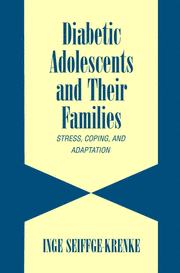Book contents
- Frontmatter
- Contents
- Foreword by Stuart T. Hauser
- Preface
- 1 Epidemiology of Chronic Illnesses in Adolescence
- 2 Coping with Illness in Adolescence: An Overview of Research from the Past 25 Years
- 3 Coping with Diabetes: A Longitudinal Study
- 4 Knowledge of the Illness, Compliance, and Patient–Physician Relationships
- 5 Self-Concept, Body Image, and Perceived Health
- 6 Adolescent, Parental, and Family Coping with Stressors
- 7 Chronic Illness and the Family: The Perspectives of Mothers, Fathers, and Siblings
- 8 Friendships, Romantic Relationships, School, and Career
- 9 Successful Adaptation or the Development of Psychopathology?
- 10 Pathways for Resolving the Dilemma between Developmental Progression and Adaptation to the Illness
- 11 Implications for Prevention and Intervention
- References
- Index
11 - Implications for Prevention and Intervention
Published online by Cambridge University Press: 06 August 2009
- Frontmatter
- Contents
- Foreword by Stuart T. Hauser
- Preface
- 1 Epidemiology of Chronic Illnesses in Adolescence
- 2 Coping with Illness in Adolescence: An Overview of Research from the Past 25 Years
- 3 Coping with Diabetes: A Longitudinal Study
- 4 Knowledge of the Illness, Compliance, and Patient–Physician Relationships
- 5 Self-Concept, Body Image, and Perceived Health
- 6 Adolescent, Parental, and Family Coping with Stressors
- 7 Chronic Illness and the Family: The Perspectives of Mothers, Fathers, and Siblings
- 8 Friendships, Romantic Relationships, School, and Career
- 9 Successful Adaptation or the Development of Psychopathology?
- 10 Pathways for Resolving the Dilemma between Developmental Progression and Adaptation to the Illness
- 11 Implications for Prevention and Intervention
- References
- Index
Summary
This book is based on the results of a longitudinal study of diabetic adolescents, their families, and their physicians. Although the study focused on a single illness, the findings are applicable to a much greater range of issues, including those pertaining to other chronic illnesses involving similar characteristics and long-term stress. This was confirmed by comparisons of our findings with those obtained in other studies. In this chapter, the possibilities for prevention and intervention are considered. To this end, some of the more consistent findings obtained in our longitudinal study are discussed. In view of the fact that our sample of diabetic adolescents was highly representative, the suggestions offered here are certainly appropriate for other adolescents suffering from diabetes or even other chronic illnesses. As this book has shown, diabetes is a challenge not only for the affected adolescents, but also for their parents, siblings, and friends and the physicians who monitor their health status. The complex interactions between medical, psychological, social, and family factors must be included in any consideration of interventions. It must be asked who needs psychological help and support, when this should be given, and how it should be organized. The limits of psychological intervention should also be taken into account. As a first step, universal and illness-specific aspects of chronic illness as they relate to developmental progression are compared, after which the appropriateness of some theoretical models for planning interventions is evaluated.
- Type
- Chapter
- Information
- Diabetic Adolescents and their FamiliesStress, Coping, and Adaptation, pp. 259 - 280Publisher: Cambridge University PressPrint publication year: 2001

